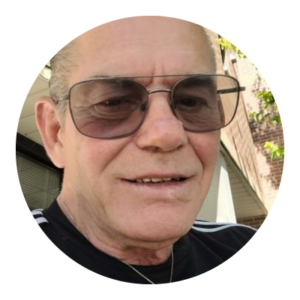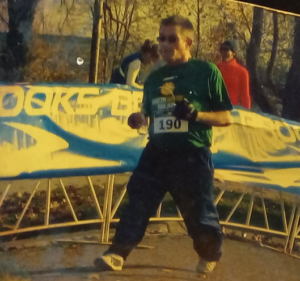 Lance Dingman is a dynamic force, contributing significantly to mental health awareness, disability inclusivity, and homelessness initiatives in Hamilton, ON. As a peer support provider at West 5th Campus – St. Joseph’s Healthcare Hamilton, and a board member of the Mental Health Rights Coalition, his profound connection to the mental health community is driven by sharing his own life experiences to foster understanding and create change. Lance contributes to many community engagement initiatives that are meaningful to him and has also been a vital part of the Housing and Homelessness Advisory Committee and the Advisory Committee for Persons with Disabilities in the City of Hamilton, advocating for inclusivity and accessibility. His dedication to sharing his own lived experiences and insights to break down barriers has made a profound impact for change, making him a compelling voice in the Collaborative.
Lance Dingman is a dynamic force, contributing significantly to mental health awareness, disability inclusivity, and homelessness initiatives in Hamilton, ON. As a peer support provider at West 5th Campus – St. Joseph’s Healthcare Hamilton, and a board member of the Mental Health Rights Coalition, his profound connection to the mental health community is driven by sharing his own life experiences to foster understanding and create change. Lance contributes to many community engagement initiatives that are meaningful to him and has also been a vital part of the Housing and Homelessness Advisory Committee and the Advisory Committee for Persons with Disabilities in the City of Hamilton, advocating for inclusivity and accessibility. His dedication to sharing his own lived experiences and insights to break down barriers has made a profound impact for change, making him a compelling voice in the Collaborative.
Fun Facts
Hometown: Hamilton, ON
Favourite colour: Purple
Hidden talent: I walk on a prosthesis and have run many marathons, including the Terry Fox run!
Bucket list item: To push forward my mental health housing project
Most prized possession: My Mom
 Lance participating in the 2012 Road2Hope Marathon, Hamilton, ON. Photo credit: Lance Dingman
Lance participating in the 2012 Road2Hope Marathon, Hamilton, ON. Photo credit: Lance Dingman
What life experiences do you think have shaped your contributions to the Collaborative most? And what impact do you think this has had?
I think, by far, my mental health experiences. Sharing my experiences is very dear to my heart. I love the people who are involved in mental health work, and I appreciate what we do for one another.
My mental health and mental health issues are a part of me and it’s in everything that I do. It is part of my identity. I’m a peer support provider at West 5th Campus – St. Joseph’s Healthcare Hamilton and I also belong with the Mental Health Rights Coalition, a mental health drop-in centre. It’s a great organization that I’ve been with since 1995 – first as a volunteer for five years and then as a peer provider for 15 years; and now I’m back on the board again. The training and experiences that I’ve had with my mental health issues and understanding how to become a peer provider has been exciting, overwhelming, and very gratifying.
I think if people are interested to hear what I say, especially at this level, I want to say it, and I want to say it as long as I can.
What does “aging well” mean to you as an older adult?
It means taking care of everything about myself. Having a routine that I love and can manage well makes me feel good about myself. I start off my morning with some exercises and a balanced breakfast. And then from there I either go to physio or volunteer. And once I get used to my new electric wheelchair and am able to get around more, I’ll be able to go to work more often as a peer provider. I really rely on it to get around, pick up supplies and go to physio.
What do you think are the most significant challenges that need to be addressed in health care to support your vision for aging?
Well. I really feel that medication is something that we need to be taking a look at. If you are taking something that doesn’t agree with you or may influence you in the wrong way and how you’re feeling, it could be traumatic for a person. You want to make sure you’re on the right medications, and you’re taking it properly. And you’re listening to what the doctor has to say. And again, having a balanced diet and a good routine is important for your health. I think that’s a big thing for me because I know it helps.
Also, for me, being active is important because I have a long life ahead of me – I’m only 61 years old and feel if I stay active and keep my strength up, I’ll be more able to participate in the community, which I love to do. I volunteer with the city and it is very rewarding work. My volunteer work is very crucial to me to keep me going. It pushes me and it gets me up in the morning. It’s very meaningful to me.
What does meaningfully engaging older adults in research mean to you?
I would say taking your time with the older adults. Speak clearly. Listen. And act! I think we have something to say. We really do. We want to go forward as much as anybody else does.
I think there are a lot of avenues for older adults to get out there and have their say. And hopefully, there will be more. I mean, I think this is why we’re making these conversations happen to find out just where the need is.
What three words would you use to describe your experience within the Collaborative?
Interesting. Satisfying. Friendly environment.
